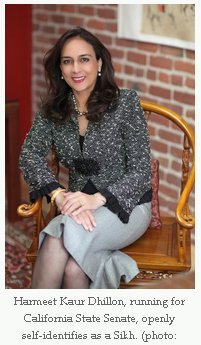 |
| Harmeet Dhillon for State Senate 2012) |
Last year, Canada went through a federal election in which Canadian Sikhs factored significantly. I asked at that time whether American Sikhs will ever be as important, politically, as our Canadian counterparts:
In terms of garnering a higher percentage of the vote, politicians in America would not likely get a lot of bang for their buck in collecting the Sikh vote as they do in Canada. Accordingly, while taking inspiration from our brothers and sisters to the north, American Sikhs – who would perhaps fall in the smaller group of higher education and income levels among minorities in the United States – may have to blaze our own trail to national prominence in this country.
One month away from US elections, we are seeing a very different path taken among the few Sikh American politicians in this cycle.
In Canada, political parties run Sikh candidates to directly reach out to the Sikh and Indian demographic, but the case is quite the opposite in the United States where the Sikh population is less concentrated. First, there are very few Sikhs running for office at the state or federal level, and among those of Sikh background running for a seat this year, most appear to predominantly downplay their faith at the very least, or promote their “Christian credentials” at the most.
In Canada, for instance, many Sikh politicians wear articles of faith – uncut beards, turbans and kirpans – and political parties openly court the community at election time. In the United States, the highest-ranking politician of Sikh heritage, South Carolina Governor Nikki Haley, identifies as a Christian and her previous faith played little part in her election.
“There are several Sikhs active in politics in America, but it’s not nearly at the same level as in Canada,” said Balpreet Singh, a Toronto-based member of the World Sikh Organization. “Personally, I think the political climate has a lot to do with it. Candidates there feel, let’s be honest, the need to highlight their Christianity.”
In the United States, “openly Sikh” candidates, while they exist, are few. One might conjecture at the reasons why: whether publicly acknowledging one’s Sikh faith is good politics, or whether a question of one’s religion has any place in the political arena.
However, we live in a culture in which the current President’s faith is constantly put in doubt, and while many politicians assert their Christian faith, it is not common for non-Christians to do the same. Why the double standard exists tells us something about the nature of religious equality in the United States today.

